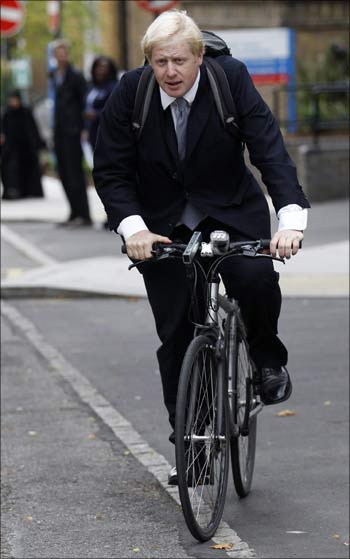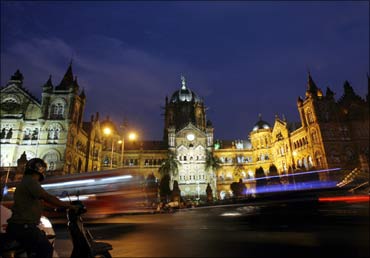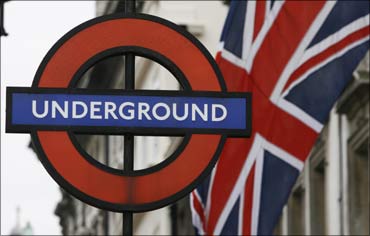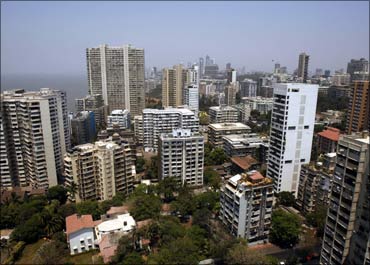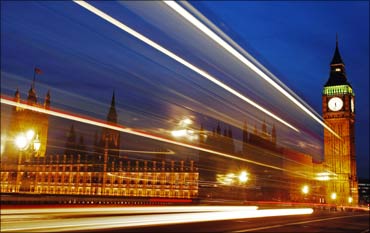 | « Back to article | Print this article |
'There's an incredible excitement about Mumbai'
As London gears up to host the 2012 Summer Olympics, Boris Johnson, the Mayor of London, tells Gateway House's Shloka Nath what Mumbai can take away from London's plans for renewal and expansion. Johnson likens Mumbai's vibrancy and potential to that of London's appeal.
What similarities do you see in some of the challenges faced by both Mumbai and London as a city?
London is different from many other cities in that we have a young population and we're likely to grow -- at nothing like the rates of Mumbai, but we will grow over the next few years, right up to 2020-2025, by about 1.3 million.
From a city of already 7.6 million, it's going to get considerably bigger in percentage terms.
And possibly there is a comparison with Mumbai, in that I think it's vital that you put in the infrastructure that a big city needs.
I'm very impressed just coming in to Mumbai, seeing the flyovers now, the big buildings, the new airport at Mumbai, things that weren't here 12 years ago.
Click NEXT to read on . . .
'There's an incredible excitement about Mumbai'
I believe very strongly, that if we in London are not to be left behind, we've got to keep investing in a very positive programme of showing that our city is the number one economic powerhouse in Europe.
Which it is; London is the biggest city in Europe, it's the most popular city in Europe, it's the financial centre of Europe, if not of the world.
Since I've been here in Mumbai the last few days, I feel there's an incredible excitement about Mumbai's economic prospects and the economic prospects of India.
People are absolutely fizzing with energy at the idea of a nine per cent growth rate and bringing into the potential middle-class, close to 700 million people who are now beginning to buy goods and services and to consume things their parents could never have dreamed of.
That is going to be a massive economic motor not only for this country but also for the rest of the world.
Click NEXT to read on . . .
'There's an incredible excitement about Mumbai'
What sort of opportunities for collaboration does India's growth present for London and the UK on the whole?
So I react in two ways: first of all, I wish we had growth rates like this. I wish that in 2011, Western economies were going to be as dynamic as it's going to be in India.
But the second thing is that there must be an opportunity here; there must be goods and services that we can sell. There must be ideas that we can exchange.
For instance, higher education is something I'm obviously extremely keen to expand in London and the UK generally. London's higher education constellation of universities is the best in the world. We have more top 100 universities in London than any one place on the planet.
I think too many young people think America is the cool place to go to for university; I think London is by far the better place to go for university. We have a much cooler time, the bars, the clubs, everything is much more exciting in London, and the social scene is much more dynamic.
I really would urge young Indians who are thinking about a place to study - London is far, far better.
Click NEXT to read on . . .
'There's an incredible excitement about Mumbai'
What sort of steps have you taken to insulate London from the recession and to ensure it remains a financial hub?
Well you've got to avoid making elementary mistakes. You've got to ensure you keep your tax regime competitive. You've got to make sure that you don't get penalized by European legislation, especially those that are designed specifically by the French or the Germans to hurt London, that I'm afraid can happen.
You've got to keep London's status as the financial capital of the world rock-solid, and you've got to speak up for the bankers -- and I do.
But to get people through the recession you have to get them the jobs and you have to keep the economy moving.
That means getting the firms to deliver apprenticeships and keeping investment in housing going.
As a result, we're continuing to invest very heavily in building new homes in London. That keeps the construction industry moving, that keeps people in jobs, it means that people can also have affordable homes. You have a virtuous economic cycle there.
Just now in London we're going through a neo-Victorian age of investment in transport infrastructure. For instance we have a gigantic new underground railway, the cross rail, which will come in by 2017-2018 and will add hugely to the capacity of London's rail service.
Click NEXT to read on . . .
'There's an incredible excitement about Mumbai'
We're also upgrading the tubes and we have ambitious plans to build more river crossings, to extend various tube lines.
But my long-term ambition is to end the very constrained conditions that people find at Heathrow airport, and come up with a new solution for aviation in London.
With regards to the Con-Dem coalition, what specific challenges has it thrown up for you as Mayor of London?
Well, it isn't so much the coalition that's the problem; the problem is the fiscal environment and the very serious economic problems that the last government left, the massive budget deficit has meant very serious retrenchment across lots of government departments and obviously we've had to fight very hard for our share of the pie.
What are you doing as Mayor of London to foster entrepreneurship and capture innovation in London?
Several things. We think there's a great future for London in making it an ever more attractive place to live in.
So, if you improve the quality of life for people in London then you will drive a virtuous circle of investment and talent coming there and also you'll make people happier and more productive.
So we're investing in things to improve air quality, new low carbon vehicles and we're radically improving the taxi fleet.
We've got a competition on now between the two major manufacturers to come up with the first zero-carbon taxi. We're introducing a new low-carbon bus, which is going to be like the old Routemasters with a hop on-hop off feature, but much less polluting.
And we already have more electric cars in London than any European city and we're hoping to encourage more electric cars.
We're putting up charge points for electric cars around the city so even if you don't have a place to plug it in because you live in a flat, you can plug it in a street or a supermarket. We see this as the future.
The technology is coming in later this year, and we believe there is going to be a steady expansion of the domestic potential for electric vehicles. We want to be in the lead on that.
Click NEXT to read on . . .
'There's an incredible excitement about Mumbai'
Thoughts on the Irish economy and its financial crisis?
Well the Irish made the mistake of joining the Euro. Which I always argued against. So I've been completely vindicated on the Euro, I think!
What have been some of the biggest challenges you've faced as Mayor of London?
It's hard; it's a big job you know. But the number one challenge, it's the recession!
I was elected in May 2008 and then the whole thing went off a cliff and Lehman Brothers went down the tubes and there I was holding the baby.
How are preparations going, and how do you see the Olympics transforming London?
I want the Olympics to drive growth in East London. It's the biggest opportunity for a hundred years for that part of London.
There's a big chunk of housing we're already building. We're going to be creating a new urban district in East London, which is going to be very much modeled on the most successful parts of London.
It won't be new high rises everywhere, instead we'll go back to the model of the Georgian terraced houses or the squares that everybody loves in the center of London, and we're going to do them in a modern way. It's going to have the biggest new park in London in 150 years, it's going to be the biggest park in Europe, a new green space and lots of other attractions there.
So its going to be a really, really amazing place. You know the Tivoli Gardens in Copenhagen? We want to put a Tivoli Gardens type place there.
Click NEXT to read on . . .
'There's an incredible excitement about Mumbai'
And we're putting in a cable car -- we haven't gotten one yet, this will be the first one in London. It's going to go from the O2, the biggest live music venue in the world over to the Excel which is this big exhibition centre across the river, and it will be about 95 metres high, so that will be a landmark and a way of getting people to come and invest in East London.
But the thing I want to do the most is to use the Olympics, the emotional and psychological boost of the Olympics, to create more commitment from the rich to the poor.
And to make people understand that this is a city that has huge potential but has massive divisions. There are people living and working in Canary Wharf, fantastic people, but they hardly know what's going on around them.
You have the same thing in Mumbai, let's be honest. You have staggering wealth right next to incredible poverty.
Well we don't have quite the same extremes in London I must be honest, but you've got the same problem. And I want to see much, much more integration between rich and poor.
Shloka Nath is a researcher in the Gateway House Studies Programme. Gateway House: Indian Council on Global Relations is a new independent, non-partisan and membership-based foreign policy think tank in Mumbai.
